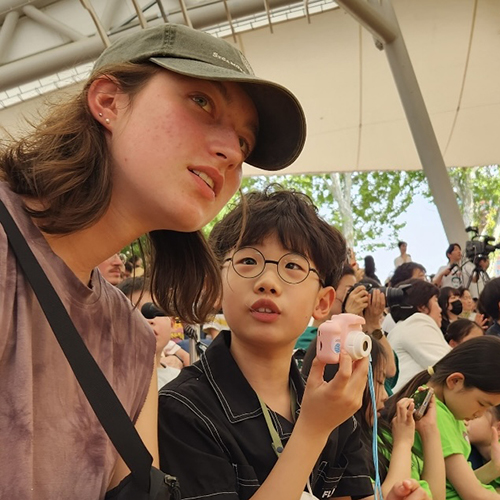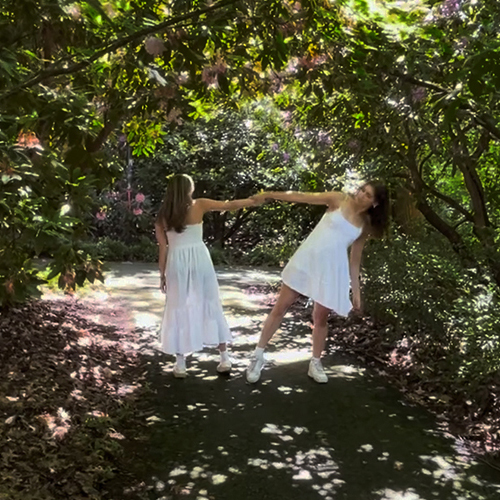Music has always been part of Julia Tai’s life. The Taiwan native began violin lessons at age four and enrolled in an elite music conservatory at age nine. But she never imagined that one day she’d be an orchestra conductor. Now she can’t imagine doing anything else.
“Conducting is very different than playing one instrument,” says Tai (DMA, Orchestral Conducting, 2010), who conducts Seattle Modern Orchestra and Philharmonia Northwest, two very different orchestras in Seattle. “As conductor, you are not one piece of the puzzle, you are the one putting all the pieces together.”

Growing up in Taipei, Tai studied violin, piano, and voice. Then she came to the U.S. to study voice at the University of Southern California (USC) and discovered an affinity for conducting. “At the time I wasn’t thinking about being a full-on conductor,” says Tai of her foray into conducting. “I just thought it could help me be more versatile.” Before long she was studying with both a choir and orchestra conductor.
Tai completed a master’s degree at USC, then moved to Seattle to study with orchestra conductor Peter Erös at the University of Washington. She was drawn by Erös’s conducting style, which was more about emotional connection to the music than technique. (Erös passed away in 2014.) Tai also liked that the UW's conducting program was small, with more hands-on opportunities than other music schools. She received support from several UW School of Music endowments, including the Alcor Endowed Scholarship.
I love the challenge of bringing people together and pulling all the sound together to make something great.
Tai conducted two operas and numerous symphony concerts at the UW, and served as an assistant conductor to Erös, leading rehearsals when he was unavailable. “With instruments, you practice at home and then perform for people,” says Tai. “But the conductor’s instrument is the choir or orchestra. If you don’t have opportunities to conduct, you don’t get to practice your instrument and improve. Fortunately, at the UW I got a lot of experience.”
Since graduating, Tai has gained more experience as co-artistic director of Seattle Modern Orchestra, a professional ensemble that she co-founded with composer Jeremy Jolley (MM, 2010) in 2010. While other Seattle ensembles play contemporary music on occasion, Seattle Modern Orchestra fills a unique niche with a singular focus on modern composers.
“Contemporary composers are always coming up with new ways of making sound, new ways expressing things,” says Tai. “They invent notations or new systems to play in. So there’s a lot of new language. Sometimes I get the score and it comes with twelve pages of instruction about what the symbols mean! I feel like I’m always learning something new.”

Soon after co-founding Seattle Modern Orchestra, Tai was named music director of Philharmonia Northwest, a community orchestra whose broad repertoire ranges from Mozart to Debussy to world premieres by local composers. Tai is just the third conductor in the orchestra’s 40-year history.
“Philharmonia Northwest has a different mindset than Seattle Modern Orchestra,” says Tai. “The musicians are not paid. They are doing this because they really love music and love playing in an orchestra. They are very skilled, and at least half of them have music degrees, but they have chosen to do something else as a career. Still, they identify themselves as musicians—sometimes more than they identify with their day job.”
As conductor, Tai sees herself as similar to a coach or project manager. While musicians are responsible for their own performance, she sees the bigger picture. And like any great coach or project manager, she must be part diplomat and part psychologist to achieve the best result. “People have personalities and their own opinions, so a big part of it is figuring out how to say something that is effective and at the same time doesn’t diminish their contribution or who they are as a musician,” says Tai. “It’s difficult at times, because musicians tend to be sensitive.”
Philharmonia Northwest will celebrate its ruby anniversary with a March 19 concert in Benaroya Hall—one of five main concerts the orchestra presents each year. Orchestra members also perform at outreach events in schools, libraries, and other venues. Since taking the helm, Tai has expanded the orchestra’s outreach efforts and fostered creative partnerships, including a recent performance collaboration with Dance Fremont. “As a conductor, music is only half your job,” says Tai. “It’s essential that you also do community outreach and education and fund raising. The conductor connects the community and the orchestra.”
Tai dreams of conducting a professional symphony orchestra one day, and has served as guest conductor for more than a dozen symphonies, including the Seattle Symphony. But right now her two orchestra jobs—plus a new baby—keep her plenty busy.
“I love the challenge of bringing people together and pulling all the sound together to make something great,” says Tai. “I can’t imagine a more satisfying job.”
More Stories

Finding Family in Korea Through Language & Plants
Through her love of languages and plants — and some serendipity — UW junior Katie Ruesink connected with a Korean family while studying in Seoul.

Dancing Across Campus
For the dance course "Activating Space," students danced in public spaces across the University of Washington's Seattle campus this spring.

Read or Listen to Faculty Favorites
Looking for book or podcast recommendations? We asked faculty who've been featured in Perspectives newsletter during the past academic year to suggest a personal favorite.